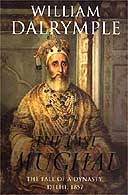 sat watching the Indian presses reaction to the blast, I was reminded of some passages that I had just read inIndian historian William Dalrymple's The Last Mughal.
sat watching the Indian presses reaction to the blast, I was reminded of some passages that I had just read inIndian historian William Dalrymple's The Last Mughal.This passage references a series of events in September 1852. It goes far in showing how these types of events have always been a part of the histories of Delhi and India. O the same page, Dalrymple provides a pointed analysis of the situation bringing their meaning full circle to the present day.Metcalfe's police in Delhi came increasingly to suspectthat the mujahadin network had begun to revive. Acting on a tip-off, they conducted a dawn raid on the premises of various known extremists and found evidence for what they believed was 'a Wahhabi conspiracy' in Delhi itself, seizing the correspondence of the fanatics [who were] preaching a crusade 'against the British'...
If the missionaries reinforced Muslim fears, increasing opposition to British rule, driving the orthodox towards greater orthodoxy, and creating a constituency for the jihadis, so the existence od 'Wahhabi conspirancies' strengthened the conversion of Jennings and his supporters that 'a strong attack' was needed to take take on such deeply embedded 'Muslim fanatics'. [Dalrymple 84]
These words came flowing back into my mind on Saturday night. The act was awful, but these awful acts are not unprecedented. Authorities and leaders should aim to learn from them and put them in context rather than sometimes acting ignorant as if the lessons of history do not exist.The histories of Islamic fundamentalism and European imperialism have very often been closely, and dangerously, intertwined. In a curious but very concrete way the fundamentalists of bothfaiths have needed each other to reinforce each other's prejudices and hatreds. The venom of one provides the lifeblood of the other. [Dalrymple 84]
No comments:
Post a Comment